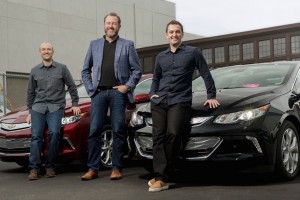
Ford CEO Mark Fields is shifting Ford's focus to broader "mobility" opportunities, including a new $182.2 million investment in San Francisco-based Pivotal.
The bonds between Detroit and Silicon Valley continue to grow stronger as General Motors, Fiat Chrysler Automobile and Ford expand their ties to the high-tech companies on the West Coast.
In the last five days, Ford and GM have spent hundreds of millions of dollars to continue their pursuit of success in what each perceives as the personal mobility market.
GM has moved is acquire Cruise Automation and plans to spend $1 billion for the company software talent and rapid development capability to further accelerate GM’s development of autonomous vehicle technology. GM entered into a broad partnership with the Lyft, the Uber competitor, to help expand its role in carsharing.
The Ford investment in Pivotal follows FCA’s news that it entered into a new partnership with Alphabet, the holding company that owns Google, that is designed to produce 100 minivans equipped with Google’s self-driving technology. Ford also courted Google.
For now, Fiat Chrysler’s partnership with Google is of limited nature and has very clear objectives, he said. “What develops from here, we’ll see,” said FCA Sergio Marchionne, who added much of the work with Google will be done near FCAs technical center in Auburn Hills, Michigan.
(FCA open to more autonomous partners; Marchionne talks product location. For more, Click Here.)

GM President Dan Ammann, center, was all smiles after announcing the maker would invest $500 million with ride-sharing company Lyft.
All of these moves are part of a larger trend by automakers to remain flexible while trying to get their fingers on the pulse of the next great wave in personal transportation.
“A lot of these companies, including Ford and GM, are playing around, trying their experiments and making sure they keep moving forward,” said Jeremy Carlson, senior analyst at research firm IHS Automotive, to the Los Angeles Times. “It’s certainly interesting, but we’ll see how agile they really are.”
The auto industry, not just the Detroit makers, has built an extensive infrastructure in Silicon Valley. BMW, Daimler AG, General Motors, Honda, Hyundai, Nissan, Toyota and Volkswagen as well as suppliers such as Bosch, Continental, Delphi and Denso also have opened research centers as well.
Ford’s $182.2 million investment in Pivotal, a cloud-based software platform company headquartered in San Francisco, is just one more example of an automaker looking to ensure it has the bandwidth necessary to remain relevant.
In the case of Pivotal, Mark Fields, Ford chief executive officer, said the investment will enhance the automaker’s software development capabilities and deliver innovations to customers more quickly.
“Expanding our business to be both an auto and mobility company requires leading-edge software expertise to deliver outstanding customer experiences,” Fields said.
(Click Here for the latest details on GM and Lyft’s autonomous plans.)
“Our investment in Pivotal will help strengthen our ability to deliver these customer experiences at the speed of Silicon Valley, including continually expanding Ford Pass – our digital, physical and personal mobility experience platform.”
The investment in Pivotal will help Ford make the transition to become both and an automaker and a mobility company, he added.
Ford is continuing to focus on and invest in its core business – designing, manufacturing, marketing, financing and servicing cars, SUVs, trucks and electrified vehicles. At the same time, the company is aggressively pursuing emerging opportunities through Ford Smart Mobility – its plan to be a leader in connectivity, mobility, autonomous vehicles, the customer experience, and data and analytics, he said.

FCA chief Sergio Marchionne said that he would not limit the company's autonomous vehicle partners to just Google at this point.
As an example, Ford plans to accelerate the incorporation of Pivotal’s advanced software development methodologies and technology across the IT, product development, and research and advanced engineering teams. Ford will also put Pivotal’s next-generation cloud platform and analytics capabilities to use on the company’s new mobility projects – such as its on-demand Dynamite Shuttle program.
“We are at a major inflection point in global business, and Pivotal is at the fulcrum of that change,” said Rob Mee, Pivotal CEO.
Software plays a growing role in new vehicles as demonstrated by the all-new F-150 that features more than 150 million lines of code, whereas a typical smartphone operating system has approximately 12 million lines.
(To see more about GM’s newly launched car-sharing service, Click Here.)
EcoBoost engine technology can be attributed to software. It allowed engineers to maximize the use of each drop of fuel at a molecular level. Ford has 275 patents covering the EcoBoost technology and another 200 pending, with a large majority covering aspects of software controls and calibration.
Michael Strong contributed to this report.
